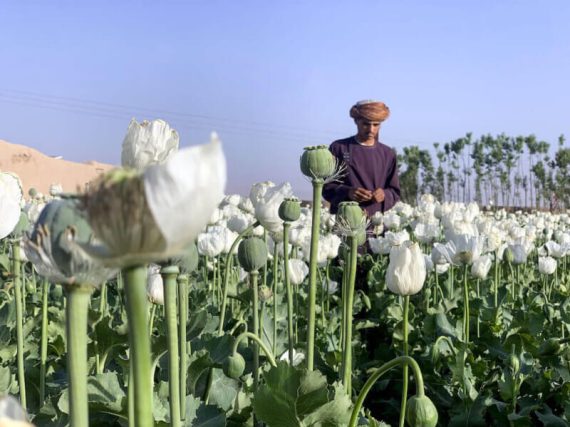A
fghanistan was the hub of opium poppy cultivation in the 1990s. The Afghan government sought to meet the supply gap; however, the government’s inadequacy and the lack of law enforcement brought about the loss of control over the countryside.
The cultivation in the countryside reached its prime when its control by the state was lost. According to the World Bank’s 2004 Social Development Paper, this was an effect of the decline in “credible law enforcements hindering the growth of the opium economy.” The situation resembles the present-day Afghanistan under Taliban rule.
Since the Taliban’s recent takeover, “the group has been trying to amend its image in the hope of earning international recognition and the easing of sanctions” reported Dilara Ozer for Politics Today. She added, “Deputy Prime Minister Abdul Salam Hanafi asked international donors for cooperation to help find alternative businesses for farmers and treat drug addicts.”
Given the poor economic circumstances, parents have resorted to sedating their hungry children by giving them medication, a report claims. Poverty reaching a record high with parents selling their daughters and organs for money. Drug consumption has become a preferred coping mechanism in the country, which cultivates 80 percent of the world’s opium.
The lack of social and public services meant that old buildings like the U.S military camps were being transformed into rehabilitation centers. In a recent documentary, Arte.tv reported the terrible conditions there as the centers lack any medical aid and safety.
The conditions reflect an inhumane treatment of patients and the poor social and economic structure of the country. Some patients are unable to leave the treatment centers, having no contact with their families, while others are unable to survive drug withdrawals due to lack of medicine and medical assistance. There are reports of infested blankets and lack of food.
Echoing the opium bans in 2000 and 2001, the Taliban’s ban, announced in 2022, aimed to earn international recognition. There were already sanctions and lack of humanitarian aid. The effect of the opium ban caused opium sales to triple from $425 million in 2021 to $1.4 billion in 2022.
There is a 32 percent increase in opium cultivation for 2022, and what these figures will look like for the 2023 report will be a deciding factor for the reliability of the recent ban and Taliban’s efforts in administration
The United Nations Office on Drugs and Crime (UNODC) questioned whether the ban will be enforced by the Taliban as the cultivation season has approached, while other sources have cited that farmers have already began cultivation – but the Taliban turn a blind eye.
The Failure of the War on Terrorism as a War on Drugs
The opium economy because of opium’s addictive nature and demand is a booming endeavor that has been used to fund warlordism, state power, and narcoterrorism. The lack of law enforcement, and the limited economic stability and support of societal development have the potential to create further issues for the crackdown on opium trafficking, cultivation, and consumption. John F. Sopko wrote that the “eradication efforts had no lasting impact on opium poppy problem” while alternative cultivation programs that did not incorporate larger security and developmental strategies ultimately become short-lived for counternarcotic goals.
Between 2000 and 2020, the UK has provided £3.5 billion to Afghanistan as “humanitarian aid”; however, it was reported in the recent Independent Commission for Aid Impact (ICAI) that most of these funds had been used towards security agencies, such as the police.
Since the primary task of the police was not civilian policing but counterinsurgency operations, the appropriation of the UK aid funds was “unwilling to challenge the U.S. approach.” Furthermore, financial flows have been reported to serve a geostrategic and military agenda in the aftermath of the NATO-led occupation. According to Jean Shaoul, institutions like the World Bank, the United Nations, and various NGOs “mobilized in this endeavor” rather than providing humanitarian aid and relief.
Recommended
Narcoterrorism
A distinction between criminal activity and terrorism is important. As Emma Bjornehed, senior lecturer at Swedish Defense University writes by referencing to the work of UNCRI member Tamara Makarenko stating that, “The most common criminal activity that terrorist organizations are involved in is the international drug trade, thus although organized crime may involve different criminal activity such as arms trade, human trafficking, racketeering, by viewing the crime aspect of the continuum as solely narcotics trade, the continuum can be used as a tool to view the concept of narcoterrorism.”
Afghanistan now faces with instabilities and increasing poverty due to insufficient control of the opium trade and other challenges. Alongside drug trafficking, the routes are also used for other illicit criminal activities. Given that the routes have been identified, Co-Chair of the Open Working Group on Sustainable Development Goals Csaba Kőrösi further mentions that the “threat from drug trafficking is linked with the threat of terrorism, regional and global security.”
The opium economy produces shocking effects on the states that oppose it. The opium economy has allowed Afghanistan to maintain its state power and the Taliban to remain warlords, but the strength of the opium economy has dismantled the state’s morality while it has remained a huge source of financial gain.
Prices have loomed and farmers are more prone to remain in the cultivation given its profit. Given this situation and the fact that the other means of production suggested for farmers have not shown to be successful under the assistance of other nations and organizations, the threat of narcoterrorism persists.
Pressure remains for counter efforts to manage the opium trade routes which vary from land, sea, and air. Given the recently announced ban and the poor law enforcement, opium prices have spiked and the Balkan Route is likely to be under more stress.





